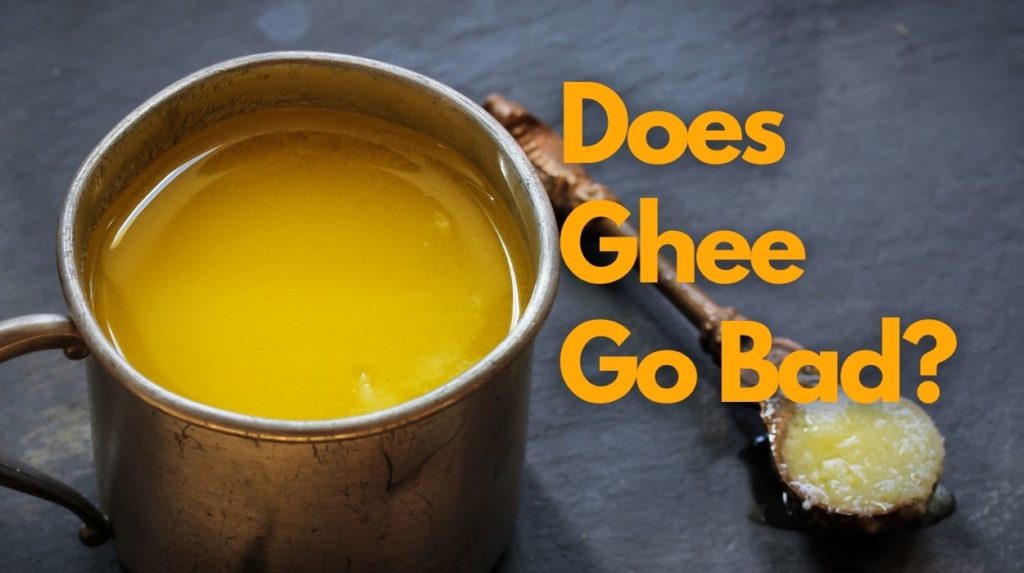
Depending on your preferred cooking style and cuisine, you might or might not have a jar of ghee lying around in your kitchen. In case it is the former, do you use it frequently, because one day or another, ghee will go bad.
Apart from the time factor, ghee can go bad in the absence of proper storage techniques. But you can increase its shelf life by storing it properly.
If that sounds useful to you, keep on scrolling as we have indulged in some of the best ways to store ghee to improve its shelf life. Along with that, we shall explain the proper ways to determine the quality of your ghee.
How Long Does Ghee Last?
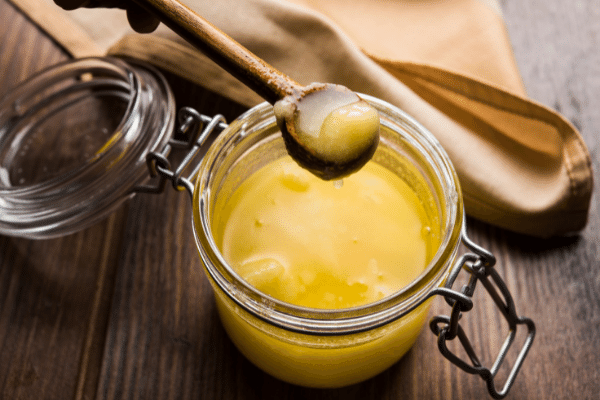
Different brands provide different guidelines on the shelf-life of Ghee. According to Lees Provisions, Ghee keeps its quality for a year after opening, while Simply Ghee suggests consuming it within three months to enjoy its best quality.
But, Ghee lasts indefinitely, and the taste remains the same for years if Ghee is stored properly, according to 4th & Heart.
The sealed and store-bought Ghee can last for 24 months in its original packaging, provided that it is stored properly at room temperature. After opening, it is best to consume the Ghee within three to four months if stored at room temperature. It lasts for a year when stored in a fridge after opening.
The homemade Ghee lasts for a year when stored in a sealed or airtight container. You must use an airtight container to store both store-bought and homemade Ghee to extend its shelf-life and sustain its quality.
| Items | Pantry | Refrigerated |
| Unopened Store-Bought Ghee | Two Years | Not Required |
| Opened Store-Bought Ghee | Four Months | One Year |
| Homemade Ghee | Four Months | One Year |
Please note these periods are just an estimate for their best quality and not the expiry date.
How do you know if ghee has gone bad?
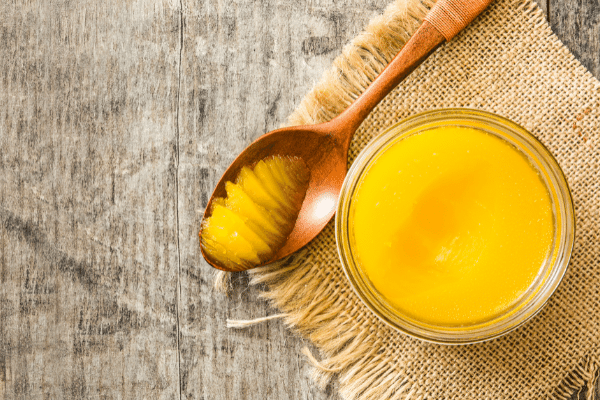
Ghee doesn’t go bad as it can sustain its quality and taste for up to a year, provided that it is stored properly at a stable temperature. The jar of Ghee comes with a best-by date which only tells you how long the brand guarantees for the best taste, quality, and flavor.
In most cases, Ghee sustains its quality for a couple of months more past its use-by date. But, it doesn’t guarantee that Ghee won’t go bad. Here are a few spoilage signs indicating when your Ghee is no longer edible.
Taste Change
Like other cooking oils, Ghee also goes off, especially when stored in unfavorable storage conditions. When Ghee goes rancid, it releases a distinct odor with taste changes. The taste gets sour with a stark white color, according to Ahara Ghee.
If you notice the sour taste of Ghee, it indicates that your Ghee has gone bad, and you must discard it.
Smell Change
Ghee usually has a milky-sweet smell when it is fresh. However, the smell of the Ghee changes when it goes rancid. So, it is necessary to conduct a sniff test to know if your Ghee has gone bad or is still edible.
If your Ghee releases a sour and distinct smell, it means the Ghee has gone off, and you have to discard it.
Mold Growth with Discoloration
Mold growth is the surefire sign of spoilage. Mold starts growing when Ghee comes in contact with air and moisture. When the jar’s lid is not properly sealed, the air leaks inside the jar.
So, if you see mold growth on the surface of Ghee along with color changes, then it means that the Ghee has gone bad, and you have to discard it.
Check The Quality
If your Ghee is quite old, you may experience the taste and smell changes, according to Ahara Ghee. So, it is best to discard such Ghee for quality purposes. Quality check is extremely important before using Ghee.
Pro Tips!
- You are not always required to discard the old Ghee right away as you can use it for other purposes like skin moisturizer, hair oil, and even eye makeup remover.
- According to Simply Ghee, ghee doesn’t go bad quickly because there is no mild solid used in Ghee, and the moisture level is very low.
What Happens If You Use Expired Ghee?
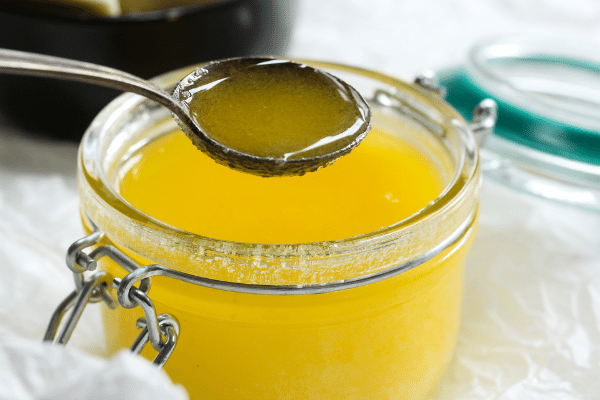
Ghee won’t make you sick even after consuming it after expiry. It is safe, and you can use it until there is no indication of bacterial or mold growth on the surface of the Ghee. Eating moldy Ghee can make you sick, and it is not advisable to consume Ghee with any signs of mold growth on it.
When your Ghee reaches the end of its shelf-life, you must discard it or use it immediately without storing it further.
Can expired Ghee make you sick?
Ghee will not make you sick if there are no obvious signs of rancidity, like an unpleasant smell or taste. Ghee can be consumed after expiry. If you experience any mild symptoms after consuming it, seek medical assistance immediately.
Can You Freeze Ghee? Refrigerated Vs. Shelf Life
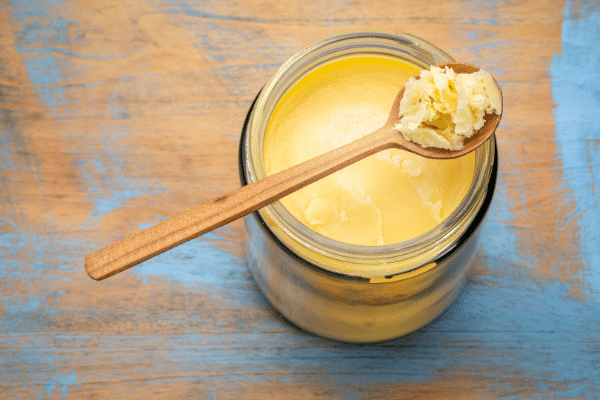
Ghee lasts indefinitely, especially when it is stored aptly. But, when you bring home an excess of Ghee that you don’t need anytime soon, freezing would be a great option for your Ghee.
But, there are a few steps to freeze your Ghee properly and enjoy its flavor for years to come.
- If your Ghee is in a glass jar, it is better to transfer it into a container, as freezing in a glass jar is not safe. Choose a plastic airtight container or freezer bag.
- If you use Ghee very often, separate the Ghee into small portions. Remember to separate the Ghee into portions that you will consume next month.
- Label the container and put it into a freezer.
You have to thaw the Ghee in a fridge overnight before using it. Freezing is only recommended when you plan to preserve it for more than three years. It keeps well in a refrigerator if you plan to use it within a couple of months.
Refrigerated
After opening the jar of Ghee, it must be refrigerated consistently to extend its shelf life up to a year. But, you don’t need to store the Ghee in a fridge if you intend to consume it within three to four months. It can keep its quality and flavor intact at room temperature for up to four months.
It is always best to store the Ghee in a fridge for long-term storage. But, you have to transfer the Ghee into a plastic airtight container before putting it into a fridge.
Transfer the Ghee into an airtight container and keep the lid tight to prevent Ghee from coming in contact with moisture and air. If you store Ghee properly in a fridge, it can last a couple of months more than the use-by date mentioned on the label, giving you extra months for consumption.
Shelf- Stable
If you keep your Ghee in the original packaging, it will last for three to four months after the initial use at room temperature. However, it varies depending upon the locations, storage conditions, and storage exposure.
If your Ghee is exposed to direct heat sources and sunlight, and the lid is not secured tightly, the shelf-life will reduce at room temperature. It is because of the moisture accumulation and oxidation process. So, it is always best to store your Ghee in a refrigerator after opening.
How to Store Ghee?
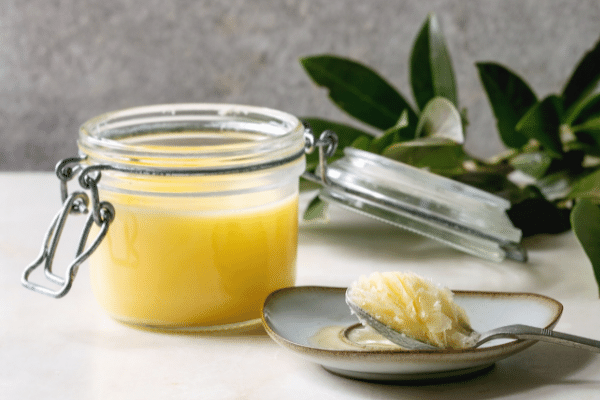
The sealed pack of Ghee needs no refrigeration as it can keep its quality up to its use-by date in the pantry. But, if you want to extend the shelf-life of your opened Ghee, it is best to put the jar into a fridge. It will last for a couple of months extra past its use-by date. But, there are other storage tips that users must keep in mind to prolong its shelf life.
Place in Cool and Dark Places
Ghee keeps its quality longer when stored aptly in cool and dark places. Ahara Ghee suggests keeping Ghee in dark places away from direct heat sources and sunlight. The jar’s lid must be secured tightly to prevent the Ghee from coming in contact with heat and sunlight.
Store Homemade Ghee in Heatproof Glass Jar
If you prefer making Ghee from scratch, it is best to store it in a heatproof glass jar. You have to pour the Ghee into the glass jar and let it cool at room temperature. After the Ghee cools down, seal the jar tightly and transfer the jar to a fridge.
Homemade Ghee lasts up to four months at room temperature and 12 months in a fridge, provided that it is transferred in a heatproof glass jar before storing.
How long can you use Ghee after the expiration date?
After considering all the possible aspects, it is safe to say that ghee has a pretty good shelf life, especially if you store it adequately. But for better references, you can use it for 3-6 months after its expiration date if the bottle of ghee is unopened and refrigerated.
If the bottle is opened, you can expect it to last for 3 months after its expiration date in the refrigerator.
What can you do with old Ghee? (Uses for Expired Ghee)
If your bottle of ghee has expired, but you do not want to toss it out, you can try using it in the following manner:
- Use it for curing minor cuts and scraps
- Use it as a body oil
- Use it for softening the cuticles
- Use it as a natural perfume
What are the Alternatives to Ghee if it has gone bad?
Finding ghee can be difficult in certain regions. But to have that rare ghee go bad can be even heartbreaking. Nonetheless, you can use the following ghee alternatives in times of emergency:
- Soybean oil
- Sunflower oil
- Coconut oil
- Seseme oil
- Butter
Frequently Asked Questions
Can Ghee Last for a Year Out of a Fridge?
No, when stored outside a fridge at room temperature, Ghee can’t last for a year. Even if the opened jar of Ghee is stored in the original packages at room temperature, the shelf life is only three to four months. It won’t spoil for up to four months when stored at room temperature, provided that it is not exposed to direct sunlight and heat sources.
Can Ghee Last Indefinitely if Unopened?
Ghee has a long shelf-life of 24 months when it is stored in its original container or package at room temperature. However, you have to take care of the storage conditions and prevent moisture from penetrating the original packaging. Moreover, the package must be away from direct heat sources and sunlight.
Does ghee need to be refrigerated?
No, it is not always necessary to store your Ghee in a fridge, especially if you are a consistent user of Ghee. Your Ghee can keep its quality and flavor for up to four months at room temperature, and if you think four months is enough to finish your Ghee, store it at room temperature without refrigerating. It won’t go bad for up to four months.
Why did my ghee turn black?
Ghee turns black when the heat transfer is too fast. In other words, it indicates ghee that’s burnt. This might affect its overall taste, so you can taste it and use or discard it accordingly.
Why did my ghee get moldy?
You might notice moldy ghee due to the lack of proper storing techniques. It is necessary to tighten the jar’s lid to avoid such circumstances.
The Bottom Line
Typically used in Middle Eastern and Asian cuisines, Ghee is the best alternative to butter. Ghee has characteristics that make it superior to butter, including its prolonged shelf-life and absence of milk solids.
Depending on the storage conditions, Ghee can last up to two years or more if properly stored.
Regardless of the reasons to keep Ghee around your kitchen, you are now aware of the best storage requirements, shelf-life, spoilage signs, risk of eating bad Ghee, and more.



